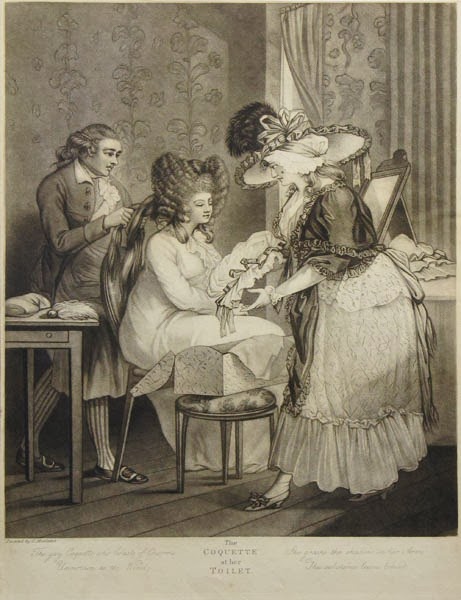There are significanly less goddesses who preen themselves in front of a mirror in the latter half of the 17th century, but a lot of Dutch middle class ladies, which is rather more interesting for this blog.
Not a very good copy, but she seems to be holding a small box and she is holding her hand in the same way ladies do on 18th century paintings when they are applying a beauty patch, so I believe this is what she is doing here as well.
Not much can bee seen on the table apart from the mirror and a round box, but it is interesting to see the hairstyle from the back.
Mirror, a large round boc, a smaller squarer one, a comb and a necklace, or possible just a piece of string. And a rather large brush, which function I wonder about. It is round and the handle is straight, which would probably make it difficult to use as a hair brush. A clothes brush, perhaps? Or possible used to brush white powder onto the skin, the lady is certainly pale enough. What do you think? (Follow the link under the picture and you will be able to zoom in on it.)
I think the red pillowlike shape is a pin cushion. If that seems like a strange thing to have at the vanity, remember that it was very common to use pins to secure clothing. There is also a small brush. Another version of this painting can be seen
here.
Another of these brushes with a straight handle.
A gigantic comb and dito brush Or is it a very full pin cushion?
A lot is going on here, boxes and bowls on the table as well as a pin cushion. Hot water is arriving and what is the maid with the bowl doing. She may be holding a wash cloth and holding a washing bowl, but my first thought was that she was applying white paint.
The evening routine seems much less ardous.
Is she holding a hair pin or is she in the process of painting her eyebrows?
This really belong to the previous post as it is from the 1630's, but I only found it today and I had to include it, as this is a rare depiction of a man making himself pretty. Notice that he is fixing his love lock.
 My second article on mid-17th century beauty is now up. Makeup trends, skin care and ingridients and I also do two makeup tutorials with period makeup. I thought it was interesting to see how different makeup can look depending on ingridient and was of application.
My second article on mid-17th century beauty is now up. Makeup trends, skin care and ingridients and I also do two makeup tutorials with period makeup. I thought it was interesting to see how different makeup can look depending on ingridient and was of application.





























































